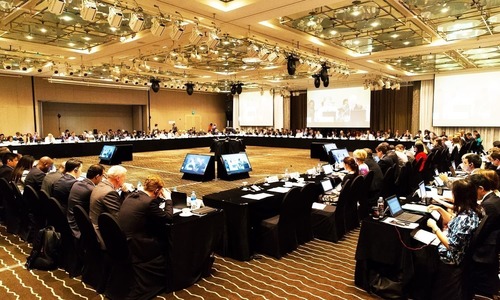Pakistan given final lifeline, to remain in FATF grey list till February 2020

The Financial Action Task Force (FATF) on Friday formally announced that Pakistan will remain on its grey list for the next four months, handing it a final lifeline after acknowledging recent improvements.
The task force directed Islamabad to take more measures for complete elimination of terror financing and money laundering while expressing serious concerns over the lack of progress in addressing terror financing risks.
“The FATF strongly urges Pakistan to swiftly complete its full action plan by February 2020,” it said in its statement. “Otherwise, should significant and sustainable progress not be made across the full range of its action plan by the next Plenary, the FATF will take action.”
"Since June 2018, when Pakistan made a high-level political commitment to work with the FATF and the Asia-Pacific Group (APG) to strengthen its anti-money laundering (AML) and counter terror financing (CTF) regime and to address its strategic counter-terrorist financing-related deficiencies, Pakistan has made progress towards improving its AML/CFT regime, including the recent development of its money laundering / terror financing risk assessment," the FATF conceded.
At the October 2019 plenary, according to the statement, the country reiterated its political commitment to completing its action plan and implementing AML/CFT reforms.
"Pakistan should continue to work on implementing its action plan to address its strategic deficiencies," it added.
However, "while noting recent improvements, the FATF again expresses serious concerns with the overall lack of progress by Pakistan to address its TF risks, including remaining deficiencies in demonstrating a sufficient understanding of Pakistan's transnational TF risks, and more broadly, Pakistan's failure to complete its action plan in line with the agreed timelines and in light of the TF risks emanating from the jurisdiction," the statement read.
"To date, Pakistan has only largely addressed five of 27 action items, with varying levels of progress made on the rest of the action plan.
"The FATF strongly urges Pakistan to swiftly complete its full action plan by February 2020."
Dawn had reported earlier that the FATF meeting in Paris had on Tuesday reviewed measures Islamabad has already taken to control money laundering and terror financing. However, participants of the meeting had made it clear that Islamabad will have to take further steps in the next four months.
The FATF has linked the blacklisting of Pakistan with unsatisfactory steps to curb money laundering and terror financing. The final decision will be made in Feb 2020.
Pakistan reaffirms commitment
In its response to the development, the finance ministry said in a statement that Pakistan’s delegation at the FATF reaffirmed its political commitment to fully implement the action plan.
"The Plenary meeting decided to maintain status quo on the FATF action plan."
"The FATF meeting considered Pakistan’s progress report on the FATF action plan and Pakistan’s APG Mutual Evaluation report (MER)," it said.
According to the statement, the delegation also held sideline meetings with various delegations and briefed them about the progress made by Pakistan on the FATF action plan and steps taken for strengthening its AML/CFT framework.
A session on technical assistance and training needs of Pakistan was also organised in collaboration with United Nations Office on Drugs and Crime (UNODC) and APG Secretariat which was attended by a number of interested countries and multilateral agencies including China, the United States, the United Kingdom, Canada, Japan, EU, World Bank, the International Monitory Fund, and the Asian Development Bank.













































